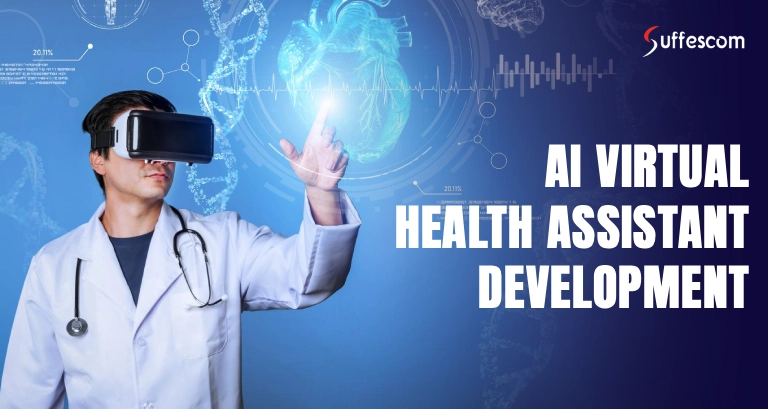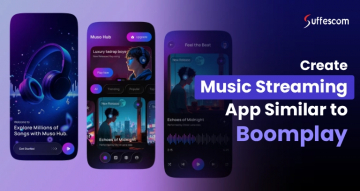AI-Powered Virtual Health Assistant Development: A Step-by-Step Guide with Real-World Impact

TL;DR
- AI virtual health assistants can save hospitals and clinics $250,000–$600,000 annually through automation of routine tasks..
- A hypothetical case study shows how a mid-sized hospital network reduced patient response time by 65% and staff workload by 38% with AI.
- Development follows 8 key steps: Requirements Gathering, UI/UX Design, System Architecture, NLP Integration, AI Model Development, Interface Development, Testing & Validation, and Deployment.
- AI assistants enable predictive care, improved patient experience, and digital healthcare accessibility, shaping the future of healthcare delivery.
Want similar results? → Get a Free Quote
Healthcare has plenty of tech, but not enough time. Doctors spend hours on documentation. Patients wait days for a callback. Data sits in silos instead of helping people get better.
That’s where AI virtual health assistant apps step in. They don’t just automate tasks they help people actually manage their health better. From answering medical questions to booking appointments, they’ve become the silent backbone of modern care.
AI-powered virtual health assistants offer a transformative solution. They provide 24/7 personalized patient guidance, reduce administrative workload for staff, and improve overall healthcare efficiency.
The market agrees too. By 2030, AI in healthcare is expected to reach $187.69 billion, growing at a 38.62% CAGR. North America leads the charge, but the demand is global.
So, if you’re thinking about building an AI healthcare assistant app, you’re not late — you’re right on time. Let’s break down what these assistants do, how they work, what they cost, and why they’ll define the next chapter of digital health.
What is an AI Virtual Health Assistant?
An AI virtual health assistant is a digital platform using machine learning (ML) and natural language processing (NLP), helping individuals to effectively manage their health. The communication takes place through text or voice, providing individuals with timely health details.
AI-powered virtual healthcare assistant app enhances patient engagement, reduces clinician workflow burden and provides 24/7 access to care. This healthcare solution is seamlessly integrated within the existing healthcare platforms and exhibits everything from seamless business processes to improved decision-making.
Moreover, with visual recognition, gesture, and facial expression, the AR overall provides assistance in physical therapy and medication intake. Even the multimodal interaction capabilities provide accessibility across diverse user needs and contexts.
It can:
- Answer health-related questions
- Track symptoms and progress
- Send reminders for medication and appointments
- Support doctors with notes and EHR entries
- Suggest lifestyle improvements based on data
Unlike static apps, AI assistants keep learning from user interactions, which means they get smarter and more personalized over time.
How Does a AI Healthcare Assistant App Work?
1. User Integration: The input is accepted through the smart devices in the form of text or voice.
2. NLP: Comprehends the user query in a conversational manner.
3. Speech Recognition: Analyzes the voice and then converts it into text
4. Data Analysis: Powerful AI algorithms interpret the user’s queries, be it health history, symptoms, etc.
5. Tailored Responses: Personalized health-related suggestions and reminders are generated.
AI Health Assistant Apps vs Traditional Health Apps
Let’s be honest most health apps are just digital notebooks.
AI assistants, on the other hand, think.
| Aspect | Traditional Health Apps | AI Health Assistant Apps |
| Functionality | Static tracking | Adaptive and predictive |
| Communication | Predefined responses | Conversational and context-aware |
| Personalization | Generic reminders | Tailored to user behavior |
| Decision Support | None | AI-backed recommendations |
| Integration | Standalone | Connected with EHR, wearables, IoT |
What this really means:
AI assistants don’t just store data they understand it, connect it, and act on it.
Challenges Solved by AI Virtual Healthcare Assistant Apps
1. 24/7 Patient Access & Faster Response Times
AI assistants provide round‑the‑clock support for questions, triage, and appointment booking, eliminating wait times for office hours or call centers.
2. Administrative Burden
They automate tasks like note‑taking, clinical documentation (SOAP notes), data entry, and billing. This frees up provider time and reduces burnout.
3. Symptom Analysis
Conversational AI helps triage minor symptoms, guides home care, and directs users to appropriate care providers using in-built decision logic.
4. Medication Management
Virtual medical assistant AI issues reminders, reports adherence trends, foresees compliance hazards, in time when the problems arise.
5. Chronic Condition Management
Ongoing tracking of vital signs through wearables, early alerts to concerning trends, and engagement of users early in the process, when a well being risk is identified.
6. Better Clinical Decision-Making
AI provided evidence-based recommendations, identified human errors, and provided support for second opinions to reduce misdiagnosis and treatment errors.
7. Personalized Treatment Planning
An AI-powered medical assistant app provides personalized plans and even educates on risks that can occur before complications arise based on medical history, genetics, behavior, and device data.
8. Operational Efficiency
Healthcare costs are reduced by eliminating unnecessary tests, streamlining operational efficiencies in appointment workflows, and automating administrative tasks.
9. Clinician Support
The AI virtual assistant solution rightly resolves the manual documentation, inconsistent notes, and billing errors. Clinical note taking AI app functionality offers template-based structures and real-time note generation, thereby reducing the documentation workload.
Scale Your Healthcare Business With An AI Healthcare Assistant App
How to Build an AI Virtual Health Assistant App
Step 1: Gathering Requirements
Start by understanding pain points and workflows of staff and patients.
Employee Questioning: Learn about bottlenecks and repetitive tasks.
Patient Surveys: Find out what patients are commonly frustrated about, e.g. wait times or a lack of individualized instructions.
Data Analysis: Assess patient inflow, call volumes, and existing digital tools.
Step 2: UI/UX Design Planning
Healthcare apps need intuitive interfaces for easy adoption:
- Wireframes: Map the major flows of the scheduling, triage and notifications.
- Visual Design: Creating polished mockups with a strong brand identity, accessible color schemes, and patient-centric imagery.
- Prototype Testing: Building and testing interactive models with real users to gather feedback and refine the experience.
Result: Eased patient experience and higher efficiency of the staff.
Step 3: System Architecture
Microservices Architecture: It provides scalable and modular development.
Custom APIs: Make sure you can integrate with EHRs and other systems in the hospital.
Security First: Implement HIPAA-compliant encryption, multi-factor authentication, and audit logging.
Step 4: Natural Language Processing (NLP)
NLP allows the assistant to understand patient queries naturally:
- Tokenization and context modeling to interpret intent
- Sentiment analysis to respond empathetically
- Voice-to-text for verbal interactions
Outcome: Patients feel like they are interacting with a knowledgeable, empathetic healthcare provider.
Step 5: AI Model Development
Develop models for personalized, predictive care:
- Predictive Analytics: Identify patients at risk of chronic conditions or readmissions
- Classification Models: Offer treatment recommendations based on historical data
- Clustering Models: Group patients by health profiles for targeted interventions
Outcome: Early identification of potential health issues, reducing hospital readmissions.
Step 6: Interface Development
Build a seamless interface accessible via:
- Web and mobile applications
- Voice-enabled platforms
- In-hospital kiosks
Outcome: Multi-channel support increases patient engagement and satisfaction.
Step 7: Testing & Maintenance
Before release, the AI virtual health assistant is tested extensively for abnormalities. Various types of testing techniques are executed for clinical validation, fine-tuning navigation, etc. To prevent the overtime AI model degradation, the continuous mobile app development services are used to refine accuracy and usefulness.
Step 8: Deployment
- Automated migration scripts reduce risks
- Real-time monitoring ensures performance and quick problem resolution
- Continuous updates improve AI capabilities and patient experience
Outcome: Smooth, risk-free implementation with measurable operational impact.
Key Technologies Powering AI Health Assistant Apps
Let’s look at what’s under the hood:
- NLP Models: GPT, BERT, MedPaLM
- Speech Recognition: Whisper, Google Speech API
- AI Frameworks: TensorFlow, PyTorch, spaCy
- Data Security Tools: OAuth 2.0, HIPAA-compliant encryption
- Cloud & Infrastructure: AWS HealthLake, Azure Health Data Services
- Integration APIs: FHIR, Epic, Cerner
These tools ensure the assistant isn’t just smart it’s compliant, scalable, and reliable.
Benefits of AI Virtual Health Assistants
AI virtual health assistants utilize natural language processing (NLP) models, predictive analysis, and EHR-integrated APIs to make personalized recommendations. As a core innovation within health care app development, these AI-driven assistants enable seamless interaction between patients and medical systems. These bots not only provide an efficient solution to the patients but also help healthcare providers to reduce their workload.
AI virtual health assistants have the following benefits:
For Patients
- Patients can have 24/7 medical access to have all their queries answered in real-time.
- As these health assistant bots have access to the extensive database of EHR, they can help customers provide personalized symptom tracking and advice. AI health bots also open new doors to the telemedicine and telehealth sectors.
- By integration with the smart wearables, AI assistive bots can accurately track medication adherence and update patients with health reminders.
- Furthermore, integrated stress management and mental health tracking tools support overall well-being.
- APIs streamline appointment booking, follow-ups, and cancellation workflows, thus improving care continuity and reducing no-show rates.
For Healthcare Providers
- AI assistants can help in time-consuming back-office operations such as maintaining patient data, claims processing, medical documentation, and updating EHR. As per a recent study, Virtual medical assistants can reduce the workload by 30-40%.
- AI models apply predictive analytics and symptom identification, reducing diagnostic variability and potential human oversight.
- Conversational AI tools facilitate continuous patient interaction through personalized communication, remote monitoring, and automated follow-ups with the patients, thus providing effective solutions for telehealth and telemedicine.
- AI health assistants generate real-time analytics and predictive insights from EHR data, enabling clinicians to identify at-risk populations, optimize care plans, and make evidence-based medical decisions.
Healthcare AI Assistants in Action: Real-World Use Cases
The healthcare industry has already started integrating AI assistants in its workflow, transferring the repetitive and quantitative tasks to the AI healthcare bots. Here’s how AI assistants are already helping the healthcare world:
Telemedicine Support
AI-powered healthcare assistants can act as the first point of contact for patients. It can conduct symptom assessment, schedule meetings, take clinical notes from conversations, and conduct pre-diagnosis triage.
Workflow Automation
The AI bots are efficient in doing tasks such as billing and insurance management, allowing the workforce to focus on non-trivial functions of the facility.
Continuous Health Monitoring
Virtual health assistants can be integrated with wearables like fitness bands or smart watches, thus allowing patients to continuously track their health in real-time.
Post-Discharge Follow-Up
Patients can get reminders for recovery steps, thus giving them post-discharge care.
Maintaining Public Health Records
With due consent from the patients, these virtual health assistants can maintain public health data, which is highly efficient in tracking disease outbreaks, assist in clinical trial design, and personalize preventative healthcare advice.
AI Health Assistant Software Development: Must-Have Features for Impactful Results
1. 24/7 Availability
AI virtual health assistants are available at any time, day or night, offering users instant access without delay. It serves usefulness and timely medical guidance in case of emergencies, when healthcare professionals are not available.
2. Symptom Checking
Allows Users to enter their symptoms, and the assistant will triage their query and use medical databases and machine learning models to analyze their inputs. The AI assistant proposes potential conditions along with an appropriate degree of urgency for seeking professional medical assistance, avoiding unnecessary clinic visits.
3. Automated Medication Reminders
Virtual assistants in healthcare offer the ability to keep track of when users should take their prescribed medications and send a reminder just in time. An AI health assistant can improve adherence to treatment plans by sending reminders that can be consistent, customized, and easy to follow.
4. Booking Appointments
AI health assistants facilitate the automatic appointment process by scheduling appointments with doctors directly using integrated systems. A virtual medical assistant AI checks the availability of providers, reschedules appointments, and sends reminders to patients to minimize missed appointments.
5. Automatic suggestions
Users obtain healthcare recommendations such as specific exercise and different meal plans, which are meant to help the user progress to their health goals. These assistants continue to learn from the user behaviors over time, and increase their relevance and richness of recommendations.
6. Mental Wellness Support
AI health assistants have the ability to conduct simple mood tracking, stress management exercises, or guided relaxation exercises, building engagement and curb feelings of loneliness or anxiety.
7. Multilingual Approach
AI healthcare assistant apps have multi-language support, auditory output options for individuals who are blind or visually impaired, and simple-to-use interfaces for individuals with cognitive limitations. This feature removes barriers to health care information.
Real-Life Examples of AI Healthcare Assistant Apps
1. Ada Health
Ada Health, the world's leading AI symptom checker and health companion, guides users through a chat-like assessment to suggest diagnostic information and next steps by asking follow-up questions. Ada is a trusted healthcare AI assistant platform with over 35 million assessments worldwide.
2. Babylon Health
Babylon Health is a hybrid platform with a virtual health app that combines AI symptom checking and telemedicine. The diagnostic chatbot analyzes symptoms, then connects users to a licensed doctor when necessary. It also includes mental wellness and chronic care monitoring through connected wearables.
3. Buoy Health
Buoy Health is another popular virtual assistant in healthcare which combines symptom assessment via adaptive chatbot questioning, followed by a recommendation of next steps like self-care, urgent care, etc. It is ideal for users who need clarity and assurance about what to do next, especially in a new or unfamiliar health care system.
4. Lark Health
Lark Health is a conversational, AI-enabled personal health coach app that focuses on chronic disease management and wellness. Lark is available 24/7 and is a conversation-based support for diabetes and other chronic conditions.
5. Healthily
This AI healthcare assistant app connects with the wellness world, featuring an AI symptom checker, wellness tracking, medical articles, and health advice. Users can log wellness metrics, such as sleep, mood, or activity, and access tips and advice based on their journals.
Transform Healthcare Delivery: Build Your Custom Virtual Healthcare Assistant App Now!
What is the Role and Future of a Virtual Assistant in Healthcare?
Understanding the Need for AI Virtual Health Assistant Development
Healthcare AI assistant platforms play a significant role in the healthcare industry. It includes administrative support, automatic patient scheduling, medical billing, and insurance processing. From EHR management to responding to queries and monitoring vital signs, the personalized approach is offered to increase patient engagement.
With AI health assistant software development, conversational support is provided to patients, including tracking their emotional states. The over-burdening need for timely mental health resources, virtual medical assistant AI helps alleviate certain pressure on the system. By offering virtual assistants as a service, healthcare providers can improve their workflows, decrease burnout, and provide more personalized patient care.
Witnessing the Future of AI Health Assistant Software Development
The future of virtual healthcare assistant apps is exceptionally bright. The advancements in AI meet the need for personalized treatment with accessible healthcare. The combination of AI and ML helps in creating future health forecasts tailored to every individual's needs.
These will blur geographical barriers with non-stop care, enabling patients to take medications at the right time and monitor symptoms 24/7. Moreover, with the integration with wearable devices and IoT, the apps will be able to gather predictive vital sign data and flag health conditions.
AI health assistant software development will facilitate pre-screening of patients, providing follow-up care results in a telehealth synergy, thereby mitigating the burden on healthcare providers.
AI Virtual Health Assistant App Development Cost in 2025
AI virtual health assistant development cost lies between $8,000 - $30,000. There are numerous factors that affect the AI development cost, some of which are mentioned below;
- App complexity and AI model depth
- Development team expertise
- Data collection and management needs
- Compliance and security requirements
- Third-party API integrations
- Testing and post-launch maintenance
| Cost Tier | Estimated Range (USD) | What you get (core) | Ideal for | Typical Timeline |
| Basic / MVP | $8,000 – $30,000 | Prebuilt NLP/chatbot APIs, basic symptom triage, appointment booking, simple analytics. | Startups, pilot projects, clinics testing value | 6–12 weeks |
| Standard | $30,000 – $100,000 | Custom UX, richer AI (contextual NLU), EHR/EMR integrations, secure auth, reporting. | SMBs, specialty clinics, telehealth platforms | 3–6 months |
| Advanced | $100,000 – $300,000 | Custom AI/ML models, advanced triage, voice assistants, device/wearable integration, HIPAA-level controls. | Enterprises, provider networks, regulated products | 6–12 months |
| Enterprise / Regulated | $300,000+ | Custom diagnostic models, advanced analytics, full EHR certification, high-availability infra, legal & compliance ops. | Health systems, insurers, diagnostic platforms | 9–18+ months |
AI Health Assistant Software Development Company- Why Are We The Perfect Fit?
As a leading AI development company, Suffescom offers sophisticated AI-enabled health assistant solutions that fit the needs of healthcare providers and patients.
Our AI engineers have knowledge of AI, machine learning (ML), and other emerging technologies. Our AI powered medical assistant app uses powerful algorithms and data analytics to improve diagnostics accuracy, personalize treatment plans and provide business efficiencies.
With over a decade of experience, we have helped startups and enterprises to realize their dream goals. Our strength is delivering intuitive and accessible interfaces that ensure seamless interaction between the patient/healthcare professional and the AI assistant.
We have a proven track record of delivering AI health assistant solutions to various healthcare organizations, with enhanced care quality and patient satisfaction.
Don't hold back, collaborate with a reliable AI healthcare software development company and take your business towards impeccable growth.
FAQs
1. How much time does it take to build an AI virtual health assistant app?
It usually ranges between $8,000 and $30,000 to build an AI virtual health assistant, depending on features, compliance, and integration needs.
2. How long does it take to build one?
3. Which tech stacks are best for AI healthcare app development?
4. Is an AI healthcare assistant app HIPAA-compliant?
5. How does an AI health assistant improve patient care?
6. How AI virtual assistants save costs?
AI virtual assistants mitigate operational costs via routine task automation, reduced administrative staff, streamlined workflows, etc. Leverage our services and save on AI Medical diagnosis app development cost.
7. How AI virtual assistants help doctors?
An AI virtual assistant helps doctors through pre-screening, offering access to patients' history, automating documentation, remote patient monitoring, etc.
8. What’s the difference between an AI virtual health assistant and a chatbot?
A chatbot answers basic queries. An AI health assistant goes deeper with symptom checks, medication reminders, and EHR integration.
9. Is an AI health assistant HIPAA compliant?
Yes, but only if developed with HIPAA guidelines. Compliance is critical for handling sensitive health data.
10. Can it connect with wearable devices?
Absolutely. Integration with Fitbit, Apple Watch, or custom IoT sensors enables proactive health tracking.
11. What’s the difference between a chatbot and an AI virtual health assistant?
A chatbot answers basic questions while AI assistants analyze data, manage care plans, and support clinical workflows.







